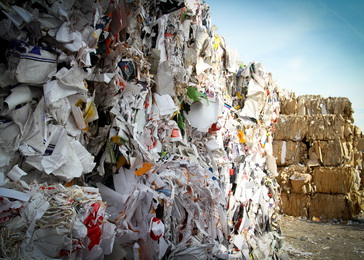 Regarding the amount of per-capita municipal waste produced, Serbia is at the bottom of the list of European countries, along with Poland and Romania. On the other hand, the majority of the waste in Serbia is disposed of in landfills, with a very small portion being recycled, while composting and natural decomposition of waste or its use for energy production is non-existent in Serbia, as shown by a survey by the European statistics agency Eurostat.
Regarding the amount of per-capita municipal waste produced, Serbia is at the bottom of the list of European countries, along with Poland and Romania. On the other hand, the majority of the waste in Serbia is disposed of in landfills, with a very small portion being recycled, while composting and natural decomposition of waste or its use for energy production is non-existent in Serbia, as shown by a survey by the European statistics agency Eurostat.
The average amount of per-capita waste in the European Union in 2017 was 487 kilograms. This is only slightly higher than one year before, when the amount was 486 kilograms, the latest Eurostat survey shows. In total tonnes, the EU produced 249,238,000 tonnes of waste in 2017, the majority in Germany with 52,342,000 tonnes. Serbia has produced 2,150,000 tonnes of waste, as shown by the survey that, in addition to EU countries, also covered candidate countries and Switzerland.
The amount of per-capita waste varies from country to country, and in five EU countries it has exceeded 600 kilograms per capita in 2017. These are Denmark with 781 kilograms, Cyprus with 637, Germany with 633, Luxemburg with 607, and Malta with 604 kilograms of household waste per capita. On the other hand, there are three countries producing under 350 kilograms of waste per capita, these being Poland with 315 kilograms, Serbia with 306 and Romania with 274 kilograms of waste.
Of the average 487 kilograms of waste in the EU, 480 kilograms are processed in some way, with a large share used for extracting new raw materials or producing energy, or the waste, if it is organic, is being composted and decomposes naturally. On average in the EU in 2017, 30% of waste is recycled, 17% is composted, 28% incinerated, with the majority used for energy production, while 24% of municipal waste is stored in landfills.
The situation in Serbia is different, since of the produced 306 kilograms of waste, only 257 gets processed, with as much as 256 kilograms ending up in landfills, while one kilogram per capita is used for obtaining secondary raw materials.
The Eurostat survey shows that the largest waste producers in Europe are also the most diligent recyclers. Thus Germany, for every 633 kilograms of waste produced, recycles 311 kilograms for secondary raw materials, and turns another 117 kilograms into compost.
Source: EURACTIV.rs
 Government of the Republic of Serbia
Government of the Republic of Serbia















 pdf [271 KB]
pdf [271 KB]
Leave a Comment